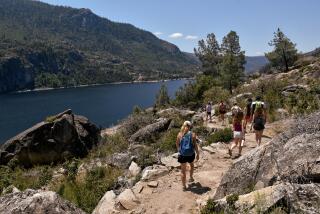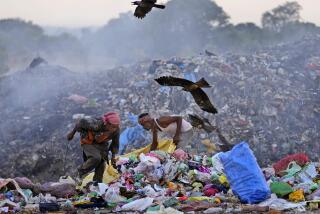Sick of Picking Up After Picnickers
ESHTAOL FOREST, Israel — Residents of this land tend to be fond of nature, but never more so than on Independence Day.
By the hundreds of thousands, city dwellers and suburbanites again celebrated Tuesday by flooding the parks and forests, filling rustic picnic spots such as this one half an hour’s drive from Jerusalem.
On such holidays, the Israeli throngs tote barbecue grills and containers of skewered meats and salads. They relax amid planted pines and eucalyptus, fresh air and birdsong. And, to the dismay of environmentalists and regulators, they leave behind staggering amounts of litter.
The trash problem in Israel’s natural areas is so entrenched that officials issue plaintive pre-holiday appeals, urging visitors to carry home their refuse. The pleas came again this week as an estimated 1 million Israelis ventured into the forests, national parks and nature reserves for Independence Day.
Nature watchers braced for the worst.
“Every Independence Day we find dozens and perhaps hundreds of tons of garbage,” said Gidi Bashan, an official of the agency that maintains the forest system.
To outsiders -- especially those weaned on the U.S. anti-littering campaigns several decades ago -- Israelis seem to embody a curious paradox on this score: They adore the outdoors but often treat it with neglect.
“Littering is a very bad habit, and Israelis generally have not been cured of it,” said Naomi Tsur, who directs the Jerusalem office of the Society for the Protection of Nature in Israel. “Somehow, ‘cleanliness is next to godliness’ is only now coming home to people.”
Part of the problem, some officials say, is that Israelis got used to people picking up after them. For years, many simply tossed their garbage where they picnicked and drove home without guilt.
Things are beginning to change.
Schools now teach children to take better care of the environment, while public-awareness campaigns directed at adults also seem to have gained a foothold.
“Many people have understood by now that they cannot expect someone else to do their cleaning for them,” said Sharon Achdut, spokesman for the Environment Ministry.
After the weeklong Passover holiday this month -- when hundreds of thousands of Israelis made use of the picnic areas and hiking trails -- one newspaper found signs of progress: People were still leaving their garbage behind, but they at least had collected it into bags. The result was impromptu garbage dumps around the overflowing bins.
The Environment Ministry deploys inspectors who are authorized to write tickets when they catch someone littering. In one recent case, a man was cited for tossing a cigarette butt from his car window and fined $60. When he challenged the ticket in court, the judge jacked up the fine to nearly $700, Achdut said.
The scofflaws annoy those Israelis who take pains to safeguard their surroundings.
Dorit Harati, 42, an outdoors enthusiast from Jerusalem, said she and her family hike and picnic with plastic bags to carry home trash they generate. During the family’s outing Tuesday beneath a stand of cypress trees here in Eshtaol Forest, the picnickers dutifully collected their trash in bags, which they planned to take home.
But not everyone does the same, Harati said. Near where her family dined on grilled chicken, signs of less conscientious visitors cluttered the forest floor: discarded cardboard boxes, plastic wrappers, cigarette butts.
“The people who do that are usually people who don’t have a culture of traveling outdoors,” said Harati, who works for a biopharmaceutical firm.
At a neighboring picnic site, Rafael Gazy, a 43-year-old Jerusalem locksmith, pointed at bags into which he was gathering his family’s refuse. But Gazy didn’t plan on taking the garbage home -- there usually was a pile in the forest that he could add to that he assumed would get picked up later, he said.
There were no trash cans in sight.
Most holiday picnickers said they had seen improvements in recent years, mainly as a result of increased awareness. Tsur said a publicity drive years ago against picking wildflowers succeeded in transforming the habits of the average Israeli.
Now, she said, “nobody picks wildflowers. You can see carpets of them and they’re treated as sacred.”
Nature lovers hope the same turnaround can occur with trash. There are fledgling efforts at recycling, but a program in Jerusalem may fall victim to city funding shortages, Tsur said. Still to be confronted, she said, is the bigger question of where to dump all the garbage so it doesn’t contaminate underground water supplies.
Some picnickers interviewed Tuesday said the government needed to do more, perhaps starting with providing more trash receptacles. Others said it was up to ordinary citizens to clean up after themselves.
Gazy said there was little point in adding cookout litter to the list of official worries when Israel has so many other pressing concerns, such as high unemployment, budget shortages and the enduring conflict with the Palestinians.
“The government has too many other problems,” he said. “Once they solve all the other problems, then OK.”
More to Read
Sign up for Essential California
The most important California stories and recommendations in your inbox every morning.
You may occasionally receive promotional content from the Los Angeles Times.










